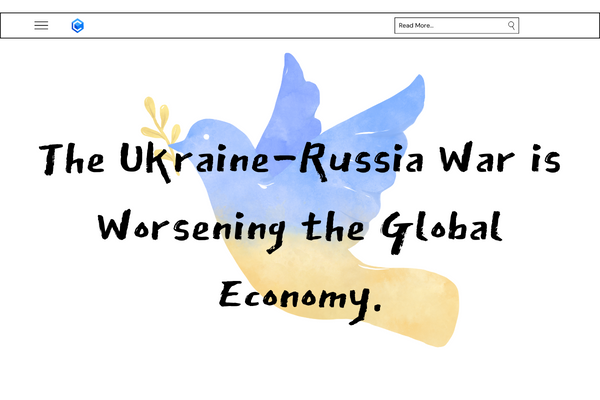The Ukraine-Russia War is Worsening the Global Economy
After six months, Russia's assault on Ukraine has effects that pose a severe threat to the world economy. In addition to a steep increase in gas costs, Russia may stop supplying gas to Europe in retaliation for Western sanctions or may run out of gas if it does not have enough storage for the winter.
As a result, Germany might experience gas rationing, which would significantly impact industries, including the steel sector, pharmaceuticals, and retail stores.
Even two years after the coronavirus epidemic severely disrupted international trade, governments, businesses, and families worldwide are still experiencing the economic effects of conflict. The skyrocketing inflation and fuel prices reflected a harsh, dark winter with Europe on the verge of recession.
Widespread hunger and discontent in the developing countries have been spurred by rising food costs and sporadic shortages, which have been made worse by the suspension of millet and fertilizer supplies from Russia and Ukraine. Currently, these shipments are being gradually resumed by Russia and Ukraine.
The capital of Uganda is located a long way from Ukraine's war-torn country; the war in Ukraine, according to Rachel Gamisha, a resident of the outskirts of Kampala, has impacted her food company. It has been hurt by an abrupt rise in the cost of necessities like gasoline, which now costs close to $7 per gallon. Additionally, he stated that items costing 2,000 shillings this week might rise to 3,000 shillings the following week.
The International Monetary Fund (IMF) predicted economic growth of 3.2 percent this year, down from 4.9 percent in July 2021, due to the war, the fourth time in a year that it has lowered its global economic outlook.
The globe appears to be extremely close to going through a global recession once more very soon, according to Piero Olivia Guernsey, the IMF's chief economist.
The first three months of the conflict in Ukraine saw an increase in food and fuel prices that led to 71 million people globally falling into poverty, according to the United Nations Development Program (UNDP). The harshest effects are claimed to have affected the Balkans and sub-Saharan Africa. One hundred eighty-one million people in 41 countries could suffer hunger this year, according to estimates from the Food and Agriculture Organization of the United Nations (FAO).
In Bangkok, Thailand, a woman named Waruni De Jai claimed that he had raised the price of food at his shop in response to rising vegetable and oil prices. He claimed that he made up for it by cutting back on staff and expanding store hours.
"My store's ability to continue charging for lunch at the current rate is uncertain. We've just emerged from the COVID-19 disaster's lockdown, and the scenario we're in right now is complex. The fact that there is still no solution to resolve this issue is much worse, "added he.
Even before Russian President Vladimir Putin issued an order to invade Ukraine, the world economy was in trouble. More quickly than anticipated, the economy recovered from the epidemic-related slowdown. Factories clogged up railroad cargo yards and ports, causing delays. Because of the labor scarcity and rising prices, inflation has soared. Central banks worldwide increased interest rates to combat inflation without slowing economic expansion.
The government's campaign against the virus has severely hurt China's economy, the second-largest economy in the world. Even while economic assistance measures have been put in place for their citizens, many developing nations are still dealing with the effects of the pandemic and growing debt.
All of these difficulties are probably workable, however. However, the West harshly sanctioned Russia after it invaded Ukraine on February 24. These two circumstances had an impact on gasoline and food trading. Russia is the world's third-largest producer of oil and natural gas, and Ukrainian fields also provide food for millions of people globally as a major exporter of wheat and fertilizer.
The Ensuing Inflation Had an Impact on the Entire World.
In the capital city of Vietnam, Hanoi, a woman called Bue Thu Huan claimed she was cutting back on eating out and weekdays to save money.
Sayaruyasin Limpo, Indonesia's minister of agriculture, has also warned that rising wheat prices might cause the cost of instant noodles, a staple food, to quadruple. Jimmy Tan, a vegetable farmer from neighboring Malaysia, bemoans the up to 50% increase in fertilizer prices.
Kamran Arif, from Karachi, Pakistan, a long way from the Ukrainian battlefield, claimed he was taking on a second part-time job to make ends meet because he could not keep up with the escalating cost of living.
The Pakistani rupee has lost 30% of its value against the US dollar. Many people live in poverty due to the government raising electricity prices by 50%.
Mohammad Shaki, who works in the import and export industry, claimed that since he could not continue ordering certain grains of wheat and beans from Ukraine, he was forced to purchase them from other nations at a higher cost.
The industrial economy of Europe, which has long relied on Russian oil and gas, is also struggling. To use heating appliances; As Russia reduces natural gas emissions, which are needed to run manufacturing and produce electricity, the likelihood of a European recession has grown. Since Russia started sending troops to the border with Ukraine in March 2021, gas prices have reportedly increased by 15 times.
According to Adam Posen, president of the Peterson Institute for International Economics and a former policymaker at the Bank of England, "Europe confronts much more recessionary pressures than other high-income countries."
The International Monetary Fund predicts Russia's GDP to decline by 6% this year. Russian economist Sergey Aleksandrenko, who now resides in the United States, claimed that domestic retail sales in Russia decreased by 10% in the second quarter of this year compared to the same quarter last year.


